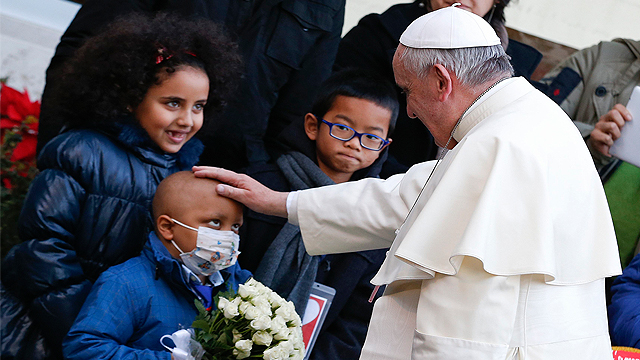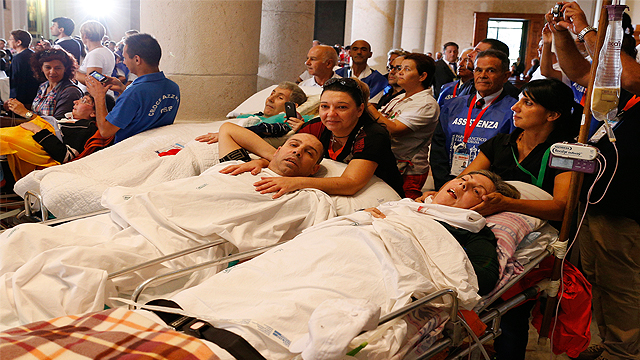

World Day of the Sick, February 11, 2015
Salt + Light Media
Tuesday, February 10, 2015

Sometimes I fancy that I could have created a better world than God has. Of course, someone could counter that God did in fact create a better world than this one, but our first parents messed it up. And that person could add that we humans continue to mess up our world through our pride, avidness and selfishness. But sickness? Tevye asks God in Fiddler on the Roof, “Would it spoil some vast eternal plan if I were a wealthy man?” I fancy asking God the same question about sickness? Couldn’t the eternal plan be just as good, even better, if there were no sickness? Out with fancy and in with theology. Sometimes theology is better than fancy—so, some theological preliminaries. First, sickness is in our world as a result of original sin. It wasn’t part of the original “eternal plan,” nor does is exist as some divine punishment. Second, and importantly, the Church means it when it speaks of the “happy fault” of the fall (the Exultet in the Easter Liturgy). With the Incarnate Word of God in our world, this world is infinitely better than the original. And this world has sickness.

I’m thinking, then, that the removal of sickness would spoil the vast eternal plan. That’s the foundation of our structure for understanding sickness. Where do we begin? Sickness falls within the general mist of the problem of evil. We can have brief glimpses of meaning in the swirling mystery. Among these are the following:Written by Leo Walsh, CSBIn the end, pain and suffering are a mystery. Blessed are those who are sick, who don’t fully understand, but who submit themselves to the Will of God who loves them with a steadfast love. Such sick people are a gift to the whole Church, evangelizing through their lived love and patient endurance.
- Pain and suffering have no intrinsic merit, as if God somehow enjoys people’s pain. We work according to God’s plan to eliminate pain.
- Hospices, when they function well to achieve management of physical, mental and spiritual pain, are in historical continuity with the great work of religious communities of men and women dedicated to the sick and dying.
- Some people endure pain in order to be clear headed rather than be pain free but with minds that are confused. This makes perfect sense, and in such cases the pain can be united with Christ’s in the work of salvation.
- Pain can bring us to realize how weak we are, how we are dependent beings, ultimately how dependent we are on God. We like to think of ourselves as masters of all we survey. Suffering clears us of that claim. Without that realization we cannot live the first Beatitude, “Blessed are the poor in spirit,” and without this our spiritual life is impossible. We rely on God’s strength alone.
- Pain and suffering bring people together. So often people bond to help the one who is sick; relatives and friends, healthcare workers, and volunteers of all stripes.
Related Articles:
Tag: cardinal omalley
5 takeaways from Pope Francis’ historic visit to the USA
Saturday, October 3, 2015
 Sebastian Gomes
Sebastian Gomes
(Photo: courtesy of CNS) How are we to evaluate Pope Francis’ historic six-day visit to the United States? Should it be considered a success? Did the Pope accomplish what he set out to do? Were there questions left unanswered? How should we gage the response of the American Church? Of the American people? What lasting […]
Like-minded, like-hearted: Boston Cardinal discusses The Francis Effect
Sunday, August 10, 2014
 Salt + Light Media
Salt + Light Media
Sebastian Gomes, Salt + Light writer/producer/director of The Francis Effect, gives us a glimpse into filming the documentary: Before and during the 2013 conclave there was much talk about the possibility of an American pope. As unlikely as it may have seemed at the time, we can now say with a degree of certainty that the […]
Vatican Connections: December 6, 2013
Friday, December 6, 2013
 Alicia Ambrosio
Alicia Ambrosio
Pope Francis decided to create a Vatican commission for the protection of minors, a cardinal involved in Curial reform announced this week. Cardinal Sean O’Malley of Boston told reporters on Thursday that the eight member Council of Cardinals which advises the pope on curial reform, had proposed the creation of a commission for the protection […]
Praying for Boston
Friday, April 19, 2013
 Salt + Light Media
Salt + Light Media
An inter-faith service was held at Boston’s Cathedral of the Holy Cross on Thursday. Below is the text of remarks by Cardinal Sean O’Malley. Religious and Political leaders took part in the service. My dear brothers, sisters and friends. On behalf of our Catholic community, I wish to welcome all of you here to the […]













